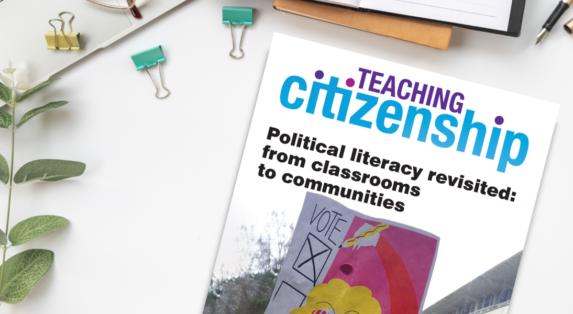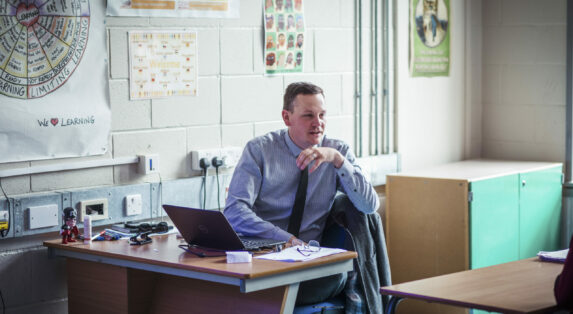
21 practical steps to incorporate political literacy in your classroom
In this article Steven shares some advice on developing political literacy in the curriculum. He has written this with non-specialist teachers in mind


Meet the author
Steven Humphries is Head of Citizenship and PSHE at Altrincham Grammar School for Girls, a large state 11-18 grammar school in Trafford, Manchester. He teaches Citizenship as a discreet subject across Key Stage 3 and 4 and has a large option GCSE group, following the Edexcel specification. He has a Religious Studies and Sociology degree and is particularly interested in Human Rights, Equality and the role of the media in contemporary society.
Politics is one of the substantial themes underpinning Citizenship education, it is specifically referenced within the Key Stage 3 and Key Stage 4 National curriculum.
The Key Stage 3 National Curriculum includes:
- the development of the political system of democratic government in the United Kingdom, including the roles of citizens, Parliament and the monarch
- the operation of Parliament, including voting and elections, and the role of political parties.
The Key Stage 4 National Curriculum includes:
- parliamentary democracy and the key elements of the constitution of the United Kingdom, including the power of government, the role of citizens and Parliament in holding those in power to account, and the different roles of the executive, legislature and judiciary and a free press
- the different electoral systems used in and beyond the United Kingdom and actions citizens can take in democratic and electoral processes to influence decisions locally, nationally and beyond
- other systems and forms of government, both democratic and non-democratic, beyond the United Kingdom
- local, regional and international governance and the United Kingdom’s relations with the rest of Europe, the Commonwealth, the United Nations and the wider world.
There are lots of ways political literacy should be increased inside and outside of the Citizenship curriculum.
In whatever time is available, it is important to identify a clear element of what I would I would call ‘pure politics’ within each year group.
Curriculum Planning
#1 dedicated time
It is not surprising that inside the classroom, explicit citizenship lessons are probably going to be the best way to increase the political literacy of students. But it is not a secret that curriculum time is tight, maybe in some educational settings even tighter or barely existent! However, in whatever time is available, it is important to identify a clear element of what I would I would call ‘pure politics’ within each year group.
In my own curriculum, Year 7 are first introduced to local governance and local councils. Year 8 explore how the UK government works and Year 9 develop their understanding of UK governance in comparison to how others around the world govern themselves. This is then further developed with a General Citizenship and PSHE programme in Year 10 and 11 exploring further political issues such as voting systems and the UK’s relations with other countries.
#2 personal reflection
Giving students an opportunity to begin to develop their own political identity/thoughts is also important within citizenship. I find it can be useful to give students access to a range of information and online tools, such as https://uk.isidewith.com and www.politicalcompass.org etc. to allow them to see where their own political views may lie.
#3 focused enquiry questions
Some example lesson enquiry questions from my own scheme of work for 2020/21
Year 7
- What are the different levels and roles of governance?
- What is the role of the local council/councillor?
- How does council decision making impact the local community?
- How is the UK part of an international community?
Year 8
- What are the different ways to run a country?
- How does UK politics work?
- How does change happen outside of politics? Exploring the role of pressure groups.
Year 9
- What’s the difference between left and right wing politics? Revisiting the political spectrum.
- Who’s Who in American Politics?
- What does UK politics say about education?
- What does UK Politics say about Aid and Global Development?
- What political issue matters to me?
- Is Russia a democracy?
- What are the similarities and differences between the UK and Russian political systems?
- What is the history of feminism and how does it impact governance?
Year 10
- What are the different way to elect governments?
Year 11
- What is the UK’s role in the international community? How does the UK contribute to the workings of the United Nations?
#4 connecting up the learning
It is also important to consider what political education students are having outside of Citizenship. For example, what are students studying in history? Is the English department setting the context for literature studied? How are students seeing governance around the world in geography? Although these conversations involve a time-investment, they are extremely worthwhile to help develop a coherent and well implemented curriculum.
Politics is everywhere, it is in your shirts, it is in your pants, it is everywhere. (Rahul Gandhi)
Resources
When I first undertook a curriculum review, I had lots of ideas but not a lot of resources. Some of the most useful sources I’ve found include:
#5 ACT
Association for Citizenship Teaching (ACT): if you visit the ACT website and click the ‘Resources’ tab, there are a multitude of lesson plans, documents, worksheets and briefing papers on a range of topics linked to politics. All these have been quality assured by the ACT team. You should also browse its extensive CPD programme.
#6 Parliament
Parliament Education/Parliament: this has been a very well utilised resource for background knowledge on key topics and up-to-date information about changes within parliament. They provide a very useful glossary! Whilst the nation is gripped by COVID, the Parliament Education Team are offering online lessons for schools, in lieu of their usual tours/face-to-face workshops.
#7 Young Citizens
Young Citizens: I found out about this resource via a newsletter forwarded from the school admin department. I signed up to their newsletter and regularly receive updates about lesson resources (free and paid), national competitions and CPD opportunities. I adapted their local council lesson, for Year 7 and it worked very well.
#8 The Economist
The Economist Democracy Index – the Economist itself is an excellent resource for keeping yourself up-to-date with politics. However, the EDI is very useful for comparative politics. Each year, they produce an insight/snapshot of global democracy, measured against 5 categories, along with a very detailed report with lots of information/figures. I used this as a foundation to explore the democratic nature of countries around the world e.g. USA, Russia, etc.
#9 Oak
Oak National Academy: some ACT colleagues and I were given the opportunity to write some lessons for Oak, so there are a number of lessons on the topic of politics for both Key Stage 3 and 4. These are great for cover lessons/ independent learning, but also useful for the development of teacher subject knowledge. The curriculum map ACT designed for Oak could also be a useful tool to consider the sequencing of lessons and how to best fit politics within the citizenship curriculum.
#10 Use A-level information
A-Level Specifications: although I don’t teach A-Level politics, I’ve found looking at the various specifications and textbooks produced has helped me develop my curriculum at Key Stage 3 and Key Stage 4. I’ve particularly utilised insight into Global Politics and Political Ideologies. For example, for the US General Election in 2020 I used elements of the A-Level USA component to devise lessons for Year 9 and will use elements of the political ideologies component to look at some Feminist and Ecology politics in Years 9 and 11.
#11 Politics Review
Moreover, if the budget allows, a subscription to Politics Review (Hodder) is a great source of knowledge for politics, very useful for the GCSE!
Political Action
Politics is much more than just voting and the work of politicians, one of my favourite political quotes is by Rahul Gandhi of the Indian Congress Party: politics is everywhere, it is in your shirts, it is in your pants, it is everywhere. The laws the government make govern what you do. Politics is everywhere. (2015)
Although there is no denying teaching the fundamental ideas and ways of politics is paramount, teaching issues which align to politics is also just as important within the Citizenship classroom.
#12 Doing politics
Active Citizenship is a key component of citizenship education and one of my favourite elements. Each year we dedicate 6-7 weeks in Year 9 for students to undertake an Active Citizenship project, this is underpinned by the ACTive Citizen Award Scheme devised by ACT. It allows students to select an issue and work in a structed manner to try and ignite change in the world. This year I will also be utilising the work of the FirstGive project alongside the ACT framework.
#13 Talking about politics
I also give students the opportunity in Year 7, 8 and 9 to give a speech about a relevant topic/issue linked to politics. I’ve found the work produced by Voice 21 (Oracy Framework) useful in giving me a foundation to plan the structure and elements of effective speech giving. This has also been supplemented by watching politicians give speeches to see how they use words to great effect. Giving 30 students the opportunity to speak, raises the awareness in the room of the prominent issues within society.
Giving 30 students the opportunity to speak, raises the awareness in the room of the prominent issues within society.
Outside the classroom
#14 Diary dates
Use Days/Events: there is no shortage of commemorative days within the calendar. Many of these can be utilised to increase the political literacy/ awareness of students. There are a number of free calendars available for teachers to use to find dates e.g. www.truetube.co.uk/calendar. I’ve also found the Cre8tive Resource calendar really useful in forward planning events, it costs less than £5! Some relevant days that connect to teaching politics include:
- 15th Sept – International Day of Democracy
- 21st Sept – International Day of Peace
- 11th Oct – International Day of the Girl Child
- 25th Nov – International Day of Elimination of Violence Against Women
- 10th December – Human Rights Day
- 20th Feb – World Day for Social Justice
- 22nd Feb – 7th March – Fairtrade Fortnight
- 22nd April – World Earth Day
- 21st May – World Day for Cultural Diversity
- 20th June – International Refugee Day
- 17th July – World Day for International Justice
Another great benefit of these days/events is that organisations often produce resources to help commemorate them, many are even free of charge. Some of the most useful I have found include: Amnesty, United Nations, TES, Cre8tive Resources, Refugee Week, and Parliament.
#15 Clubs and societies
Clubs/Societies: if the curiosity of students is ignited within the classroom, they should hopefully wish to follow this up, outside of the classroom. Running clubs and societies is a great way to develop political literacy/insight among students.
Politics Society: this has been a studentled club at my school for years. A group of students take the lead on preparing sessions
each week for others to attend. Some of them are very informative, giving/extending knowledge e.g. an in-depth examination of the UK political parties, the politics of other countries e.g. USA etc. Other sessions give students an opportunity to work with other year groups in preparing for a debate the following week. The society has also been very fortunate to have been visited by local councillors and MPs – all of which have been arranged by the students themselves.
Social Action Society: this is a society I run to explore social issues with students. Curriculum time is not in abundance, so often I can’t go into the depth or explore all the examples I like to, this is a club I open to all year groups. Students often bring their own ideas they’d like to explore but some of the material I utilise within the club come from Amnesty (Youth Group Affiliation costs £21 and gives access to lots of resources and support from Amnesty), including their annual ‘Write for Rights Campaign’. Oxfam School Groups/Oxfam’s Education Department are also worth contacting, similarly to Amnesty, they support work on global issues and social e.g. Behind the Barcode. I have also attended some training by the PeaceJam Foundation who have devised a curriculum around Noble Peace Prize Winners and how their message can be utilised in bringing peace and change into the world today. They also champion the social action initiative of ‘1 Billion Acts of Peace’ – encouraging young people to take action, big or small, to make the world a better place.
#16 Simulations
Model United Nations (MUN): before supervising my first conference, I’d never heard of it, now I love it! It is an outstanding way for students to immerse themselves in the big political issues of the day. The basic premise is that students adopt the perspective of a UN member state and represent them in various committees/General Assembly. Attending a conference requires students to undertaken in depth research of issues and countries they may not be familiar with. It also develops their communication skills as they have to speak in front of large groups. The following sites gives a very useful overview: www.una.org.uk/get-involved/learn-and-teach/model-un-portal – however, the best way to experience MUN is to visit a conference. Many take place across the country.
#17 Library links
Something I’m going to try this year is the UN’s Sustainable Development Goal Book Club – signing up to their scheme gives access to a range of books, linked to the Sustainable Development Goals. This offers a different point of entry to many of the global issues today. In the meantime my librarian recommends:
- Politics for Beginners by Alex Firth
- Speak Up! our voices will be heard by Laura Coryton
- The Life You Can Save by Peter Singer
- Rebel Voices: the rise of votes for women by Eve Lloyd Knight
- Becoming by Michelle Obama
- What is Politics? Why should we care? and other big questions by Michael Rosen
#18 Mock elections
Parallel Elections: when an election is called, running a school-wide parallel is also an excellent way to get students involved in the political process. Numerous organisations can support the organisation of this – ACT, Politics Project, First News. Many of the resources for the 2019 election are still available online.
You could also consider, running an election in parallel for a country outside of the UK e.g. the USA. Or you can choose another election to reflect the make-up of your student body, it is really important students are exposed to the politics of other countries, and it makes sense to build on students’ knowledge of, and connections in, other countries.
#19 Real elections
School Council: a school council should embody the democratic system, from the way students stand for election, to the election process and to how it is organised and managed.
#20 Interviewing and listening to outside speakers
Speakers: we are fortunate that local councillors and MPs have also been happy to visit the school to speak to students and answer their questions. We’ve also had speakers from organisations such as Amnesty International (their school speaker programme is a useful resource to tap into) and Diversity Role Models (see their article in this edition of the journal). I’ve also been fortunate to be able to work with the Politics Project who have given students the opportunity to engage with politicians firsthand (see their article in this edition of the journal). For example, through their Digital Surgeries students have had the opportunity to ask and hear from MPs and Peers.
#21 Talking to external audiences
Moreover, recently, students gave evidence to a transport select committee on issues surrounding young drivers, Victoria, a student who took part said:
“I think taking part in the select committee was important for us as young people because it was a way for us to have a say in changes that would be made to our lives in the future. It was a good way to hear young people’s views on the issues, given that we can’t all vote and have our say in politics that way. The event gave us a first-hand insight into parliament and the ways they gather evidence and opinions on policies they are debating at the time. I would recommend all young people to take any opportunities offered to learn and impact politics today as an educative tool as well as a platform for positive change.”
Teaching politics was a huge learning curve for me when I started teaching Citizenship. However, the more I’ve taught myself and shared with students, the more I see the importance of ensuring students are politically literate. The topic of politics and issues dealt with by politicians cannot be escaped, it is therefore crucial students leave the classroom with an understanding of what’s going on and how they can use their political voice to enact change both within formal politics and outside of formal politics. Yet, it’s a never-ending pursuit, I don’t think you’ll ever have a politics scheme of work ‘planned’ – there’s always something else to know, include, update. But, isn’t this why it’s so important and why as Citizenship teachers, we love it?

